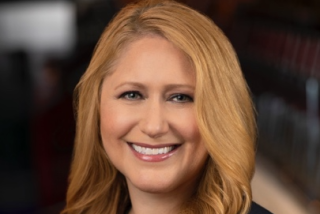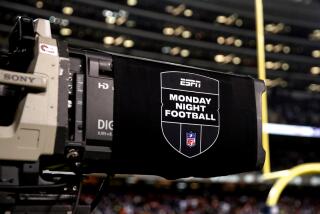DirecTV executive blasts broadcasters at congressional hearing
WASHINGTON -- Consumers should get to choose which broadcast networks they want to pay to receive, a senior DirecTV executive told Congress on Wednesday.
In testimony to a House Energy and Commerce subcommittee on communications and technology, DirecTV executive vice president Mike Palkovic said new rules are needed for broadcasters such as CBS, NBC, ABC and Fox when it comes to negotiating distribution contracts with pay-TV distributors.
“Broadcasting remains governed by antiquated laws designed to favor the broadcaster over the viewing public,” Palkovic said.
PHOTOS: Hollywood backlot moments
In his testimony, Palkovic said the cost to DirecTV to carry broadcast networks will rise 600% per subscriber between 2010 and 2015. He added that these fees are on top of money the satellite broadcaster pays broadcasters for cable channels they also own. For example, News Corp. owns Fox Broadcasting as well as several popular cable networks, including FX and Fox News. Walt Disney Co. owns ABC as well as ESPN, the Disney Channel and ABC Family.
“In 1992, the broadcasters owned four cable channels. Today, they own over 104 cable channels, a 2,500% ownership increase,” Palkovic said. NBC, he noted, had one cable channel -- CNBC, but now it owns 22 national cable networks and 11 regional sports networks.
“These corporations use the retrans process to force our customers to take, and pay for, all of their channels regardless of whether they watch them or not,” he said.
This also limits the amount of channel space that DirecTV and other distributors have to carry channels that are not owned by big media and thus do not have the leverage to negotiate favorable carriage agreements, Palkovic charged.
PHOTOS: Celebrities by The Times
Palkovic called for Congress to let broadcast networks negotiate directly with consumers.
“A consumer could, for example, choose ABC and NBC, but opt out of CBS and Fox, as they do today with HBO and Showtime,” he said. Such an approach, he argued, would end the blackouts that occur when a broadcaster and distributor are unable to come to terms on a distribution contract, as well as give consumers choice and broadcasters the ability to “charge as much as they think their content is worth.”
During the same hearing, Ben Pyne, president of global distribution for Disney Media Networks, countered that the retransmission consent system is “working well,” and added that “over the years thousands of privately negotiated agreements for retransmission consent have been reached with extremely few interruptions of service.”
Marci Burdick, a senior vice president for broadcaster Schurz Communications Inc., also said DirecTV and lawmakers interested in changing the current system are barking up the wrong tree.
“The retransmission consent system in place today has a success rate of 99%. Only in Washington, D.C. could something that works 99% of the time, providing for thousands of deals every year, be called ‘broken,’” Burdick testified.
The testimony from Palkovic, Pyne and Burdick was part of a hearing to determine whether the Satellite Television Extension and Localism Act (STELA), which regulates much of the satellite broadcasting business, should be reauthorized or scrapped.
ALSO:
Showtime Chairman takes shot at media
Cable industry to discuss challenges and hear from Jennifer Lopez
Stephen King’s ‘Under the Dome’ on CBS could create new TV model
Twitter/@JBFlint
More to Read
From the Oscars to the Emmys.
Get the Envelope newsletter for exclusive awards season coverage, behind-the-scenes stories from the Envelope podcast and columnist Glenn Whipp’s must-read analysis.
You may occasionally receive promotional content from the Los Angeles Times.






